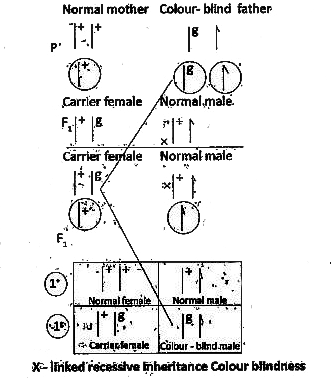What is crisscross inheritance ? Explain the inheritance of one. " sex linked recessive character in human beings. Solution in Telugu
The criss-cross pattern of inheritance (skip generation inheritance) is one in which a gene responsible for the sex linked recessive character is transmitted from a male parent to a male grand child through a carrier female of the first generation. Colour blindness is the best example for criss-cross-inheritance in human being. Colour blindness is a sex-linked recessive disorder. Retina of the eye in man contains the cells sensitive to red and green colours. This phenotypic trait is genetically controlled. Its alieles are located on the X-chromosome. When a woman with normal vision (homozygous) marries a colour - blind man, all the sons and daughters are normal, but daughters are carriers (heterozygous). If a carrier woman marries a man with normal vision, all the daughters and half of the sons have normal vision and another half of sons are colour-blind. Colour-blind trait is inherited from a male parent to his grandsons through carrier daughter, which is an example of crisscross pattern of inheritance.
Haemophilia : Haemophilia A is recessive X-linked genetic disorder involving lack of the functional clotting Factor: VIII and represents 80% of haemophilia cases, Haemophilia B is also a recessive X-linked genetic disorder involving lack of the functional clotting Factor IX. When a person with hemophilia is injured, bleeding is prolonged because a firm-clot is slow to form Haemophilia follows the characteristic crisscross pattern of. inheritance like that of colour - blindness.
Duchenne Muscular dystrophy: (DMD) is a recessive X-linked form of muscular dystrophy, affecting around-1 in 3,600 boys. The disease is characterized by a progressive weakening of the musales and loss of coordination: Affected individuals rarely live past their early 20s. The disorder is caused by a mutation in the dystrophin gene (the largest known gene in humans) located on the X-chromosome, which codes for the protein dystrophin, an important structural component within muscle tissue (connects sarcolemma and the outer most layer of muscle filaments and supports muscle fiber strength). If the mother is known to be a carrier of this gene, about half of her male children are expected to be affected. All female children born to a carrier mother are expected to be normal, since the possibility of their being homozygous for this sex - linked recessive gene is virtually non existent.

Topper's Solved these Questions
Similar Questions
Define and explain water potential.
View SolutionDescribe the structure of the heart of a man. Draw a neat labelled diagram of it.
View SolutionGive an account of glycolysis, Where does it occur ? What are the end products? Trace the fate of these products in both aerobic, and anaerobic respiration.
View SolutionWhy are sex linked recessive characters more common in the male human beings?
View SolutionExplain the inheritance of sex linked characters in human being .
View SolutionWhy are sex linked recessive characters more common in the male human beings?
View SolutionWhy are sex linked recessive characters more common in the male human beings?
View SolutionWhat is inheritance of acquired characters?
View SolutionWhich one of the following is the sex linked character in human inheritance?
View SolutionWhich pattern of inheritance is seen in sex linked characters ?
View SolutionWhat is sex linked inheritance?
View SolutionWhat is sex-linked inheritance?
View SolutionTrue character of sex linked inheritance is:
View SolutionCriss cross inheritance is shown by
View SolutionExplain the inheritance of sex linked recessive character in human being.
View SolutionExplain the inheritance of sex influenced characters in human beings.
View Solution
